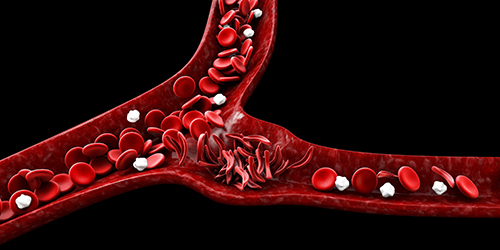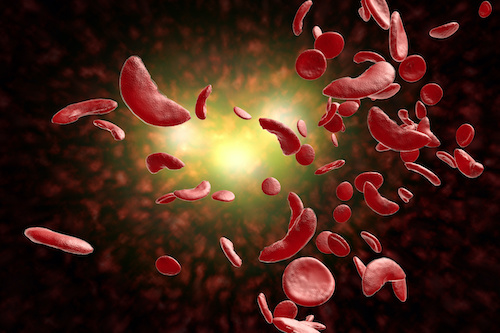Rutgers Cancer Institute of New Jersey is a component of the Regional Comprehensive Sickle Cell Center at Rutgers Robert Wood Johnson Medical School and serves as the state’s primary referral program for the diagnosis and management of sickle cell disease and other related blood illnesses. The Sickle Cell Center, staff and resources are comprehensive and have a focus on both pediatric and adult patients.
Center at Rutgers Robert Wood Johnson Medical School and serves as the state’s primary referral program for the diagnosis and management of sickle cell disease and other related blood illnesses. The Sickle Cell Center, staff and resources are comprehensive and have a focus on both pediatric and adult patients.
What is sickle cell disease?
Sickle cell disease is an inherited disorder of the red blood cells. It involves a defect in the hemoglobin protein which is found inside of the red blood cells. Hemoglobin is responsible for bringing oxygen from the lungs to the rest of the body. Normal red blood cells are shaped like a doughnut, they’re round and flexible which allows them to travel freely through the blood vessels. In patients with sickle cell disease, the red blood cells are rigid and shaped like a sickle or banana which prevents free travel through the blood vessels, instead there is a tendency for the red blood cells to clump together and get stuck. This blockage prevents oxygen from getting to where it needs to go which can lead to episodes of severe pain and tissue and organ damage.
How is sickle cell disease diagnosed?
In the United States, all newborn babies undergo screening tests within the first few days of life to detect serious, life-threatening diseases. A hemoglobin electrophoresis is a newborn screening blood test that can determine if the baby is a carrier of sickle cell trait or has sickle cell disease. Sickle cell disease also might be diagnosed before a baby is born with a test on the amniotic fluid or with a sample of tissue from the placenta.
What are the biggest challenges for sickle cell patients?
Because sickle cell disease is a chronic lifelong condition, patients and families face many physical and psychosocial challenges throughout their lives. Depending on the severity of the disease, these challenges could include frequent disruptions in their daily lives. Patients may find it difficult to maintain a full-time job or to attend school on a regular basis. These patients are at a high risk for stroke and other cardiac and pulmonary problems as well as being at a high risk for infection. Additionally, one of the most common complications of the disease is vaso-occlusive crisis (VOC), known as sickle cell crisis, which is characterized by episodes of severe pain.
What is the treatment plan for patients with sickle cell disease?
As the state’s primary referral site for sickle cell patients, Rutgers Cancer Institute as part of the Rutgers Robert Wood Johnson Medical School Regional Comprehensive Sickle Cell Center is able to treat both pediatric and adult patients using well proven therapies and cutting-edge clinical trials. Since 2017, there have been more FDA-approved drugs available to help reduce the symptoms of sickle cell disease. Currently, the only cure for this disease is a bone marrow transplant. Over the last decade, there have been significant advances in the field of bone marrow transplant, resulting in increased success rates even for patients without a matched sibling. This has led to more patients benefiting from this approach. Gene therapy is also emerging as another potential curative option for these patients.
For additional information or to schedule an appointment call 844-CANCERNJ.
Related News

Living With Sickle Cell Disease
Dr. Cole and Dr. Drachtman discuss living with sickle cell disease in this video series. Watch here

